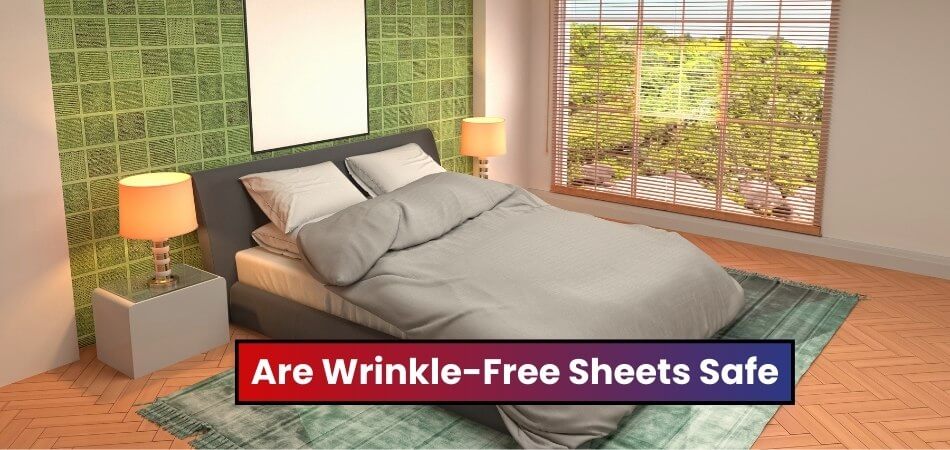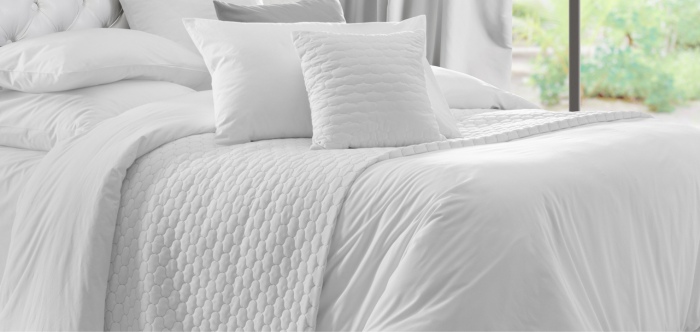In recent times, a good night's sleep has been increasingly associated not only with comfort but also with the safety and health implications of our bedding choices. Among the variety of options available in the market, wrinkle-free sheets have gained popularity due to their neat appearance and easy maintenance. However, the question arises: Are wrinkle-free sheets safe?
The answer is more complex than you might think. The allure of hassle-free, pristine bed sheets might be compelling, yet the reality is far from comforting. The key to their creaseless facade lies in a chemical treatment based on formaldehyde, a substance notorious for causing skin irritation, respiratory problems, and even, alarmingly, cancer.
When considering a purchase, it's essential to delve deeper into the products that boast labels like wrinkle-free, wrinkle-resistant, or perma-press, as these terms could be veiled warnings of the toxic dangers lurking in our bedding.
Overview of Wrinkle-Free Sheets
Wrinkle-free sheets are synonymous with convenience and a neat appearance without the need for tedious ironing. This attractive quality has led to its prevalence in modern households. However, the dark side of this convenience is the chemical treatment these sheets undergo.

The treatment involves formaldehyde-based chemicals that keep these sheets looking pristine. The fallout, however, is a potential adverse reaction on our skin and respiratory system. Continuous exposure even hints at a cancer risk, making these sheets a concerning choice.
The buzzwords ‘wrinkle-free' or ‘perma-press' are not just indicators of easy care but potentially a red flag for health-conscious consumers. Knowing the possible hazards, opting for natural, untreated fabrics seems prudent. Therefore, understanding the actual cost of wrinkle-free sheets is essential for making an informed, health-conscious bedding choice.
Are Wrinkle-Free Sheets Safe?
Wrinkle-free sheets are a modern convenience that many have turned to for a crisp, neat bed with minimal effort. However, the safety of these sheets has become a topic of concern. The chemicals used to achieve that wrinkle-resistant quality have come under scrutiny for potential health risks. No, wrinkle-free sheets are not considered safe due to the chemicals used in their treatment.

Chemical Treatment
Wrinkle-free sheets undergo a chemical treatment to maintain their smooth appearance. The primary chemical used is formaldehyde, which adheres to the fibers to keep them in place. The bond between the chemical and the fibers is what grants the sheets their wrinkle-resistant quality.
Health Implications
Exposure to formaldehyde can lead to skin irritation and respiratory issues. Continuous or long-term exposure heightens the risk, potentially leading to severe health problems. Some studies have linked formaldehyde exposure to cancer, raising serious concerns over the safety of wrinkle-free sheets.
Alternative Choices
For those concerned about health implications, organic or untreated sheets are a safer choice. They may require ironing, but they avoid hazardous chemical treatment. Investing in such alternatives can grant peace of mind and a healthier sleep environment.
Environmental Concerns
The chemical treatment process is not only harmful to humans but to the environment as well. Chemical run-off from factories can pollute water sources and soil. The process contributes to the more significant problem of industrial pollution, which is detrimental to ecosystems and biodiversity.
The neat appearance of wrinkle-free sheets may be tempting, but the potential health and environmental risks are disconcerting. Considering the hazardous implications of the chemical treatment, opting for natural, untreated fabrics may be a prudent choice for both our health and the environment. Making an informed decision about our bedding can contribute to better sleep, personal health, and a cleaner environment.
Why Choose a Wrinkle-Free Sheet Over Traditional Sheets?
In our busy lives, finding convenient solutions for everyday chores is invaluable. One such solution is the use of wrinkle-free sheets that spare us the ironing time.
They offer a neat bed with little to no effort, but are they a better choice over traditional sheets? Let's delve into the reasons why some might prefer wrinkle-free sheets.
Time-Saving
Wrinkle-free sheets are a time-saver, eliminating the need for ironing. This convenience can be vital for those with hectic schedules. They stay smooth and neat, demanding less of your time and effort.
Appearance
The crisp, clean look of wrinkle-free sheets is undeniably appealing. They maintain a fresh appearance longer, even after several nights' use. The aesthetic value they add to your bedroom can be quite satisfying.
Maintenance
Easy care is among the top advantages of wrinkle-free sheets. They usually retain their quality even after multiple washes. The longevity and consistent appearance make them a low-maintenance option for many.
Cost-Effectiveness
Though initially more expensive, their durability could mean savings in the long run. They require less frequent replacement compared to traditional sheets. Additionally, the cost of time and energy saved on ironing should be considered.
Wrinkle-free sheets do come with enticing advantages primarily centered around convenience and appearance. However, the underlying chemical treatment that grants them these benefits also poses potential health risks.
When choosing between wrinkle-free and traditional sheets, weighing the convenience against the potential health implications is crucial. Making an informed choice based on personal priorities and health concerns will lead to a more satisfying and safe sleeping environment.
Potential Issues With Using the Wrinkle-Free Sheets
The modern quest for convenience has led to the creation of wrinkle-free sheets, reducing the chore of ironing. However, this convenience comes at a cost, not just financially but potentially to our health and environment. Here, we delve into the issues surrounding the use of wrinkle-free sheets.

Chemical Exposure
Wrinkle-free sheets undergo chemical treatments to retain their smoothness. Formaldehyde is a common chemical used in this process. Prolonged exposure to formaldehyde can lead to various health issues.
Skin Irritations
The chemicals can trigger skin irritations or allergic reactions. Individuals with sensitive skin are especially at risk. These irritations can disrupt sleep, negating the convenience of wrinkle-free sheets.
Respiratory Problems
Inhaling formaldehyde fumes can cause respiratory problems. Symptoms include throat irritation and coughing. Over time, this exposure could lead to more severe respiratory issues.
Potential Carcinogenic Effects
Studies have shown that formaldehyde is a potential carcinogen. Long-term exposure could increase cancer risks. This potential risk makes wrinkle-free sheets a concerning choice.
Environmental Harm
The chemical treatment process is environmentally detrimental. It contributes to water and soil pollution. The eco-unfriendliness is a significant downside of wrinkle-free sheets.
Cost
Wrinkle-free sheets are often pricier initially. The cost doesn’t end with purchase; potential health issues may incur medical expenses. The financial burden is a consideration that can’t be ignored.
The appeal of wrinkle-free sheets comes from their convenient and tidy look. Yet, the risks of chemical exposure, health issues, and environmental damage are concerning. It's vital to balance the maintenance ease and aesthetics against these risks for a safer, eco-friendly sleep environment.
Tips to Keep Your Traditional Sheets Wrinkle-Free
A neat, wrinkle-free bed is inviting and visually pleasing. However, with the concerns surrounding chemically treated wrinkle-free sheets, many are reverting to traditional sheets.
Here are some tips to keep your traditional sheets wrinkle-free, combining safety with aesthetics.
- Ironing: Ironing your sheets while they are slightly damp can make the task easier. A good steam iron can quickly smooth out wrinkles, leaving sheets crisp.
- Proper Washing: Avoid overloading the washing machine, as sheets need space to move freely. Washing sheets separately can prevent twisting and reduce wrinkles.
- Dryer Settings: Utilizing a low heat setting on the dryer helps prevent excessive wrinkling. Removing sheets promptly when dry and folding them neatly keeps wrinkles at bay.
- Bed Scrunchie: A Bed Scrunchie is a tool that keeps sheets taut and in place. It's an effective way to maintain a smooth bed surface without any chemicals.
- Folding Technique: Proper folding and storage prevent creases from setting in. Store sheets flat in a cool, dry place to maintain their smoothness.
- Spray Solutions: A mild fabric spray can ease wrinkles; choose natural or homemade solutions. A light spritz and smoothing with your hands can do wonders.
- Quality Fabric: Investing in high-quality, natural fabrics can make a difference. Quality sheets often have a smoother texture and retain fewer wrinkles.
Achieving wrinkle-free traditional sheets is possible with some extra care and the right tools, like the Bed Scrunchie. These tips aim to provide a middle ground, offering the neat appearance of wrinkle-free sheets without the associated risks. Keeping our beds tidy and safe doesn’t have to come at the expense of our health or the environment.
Bottom Lines
In navigating the intersection of convenience and health, the question “Are wrinkle-free sheets safe?” emerges with a nuanced answer. While the modern appeal of hassle-free, neat bedding is undeniable, the health and environmental implications tethered to wrinkle-free sheets present a severe cause for reconsideration.
The chemical cornerstone, formaldehyde, unveils a potential pathway to skin irritations, respiratory issues, and even cancer. Despite the sleek facade, the underlying risks pose a substantial price.
However, the shift towards traditional sheets, complemented by simple practices like proper washing and the use of tools like Bed Scrunchie, presents a viable route to safe, aesthetic satisfaction. As we retreat to our beds for comfort, making an informed, health-conscious choice between wrinkle-free and traditional sheets is an investment in our well-being and the environment.






